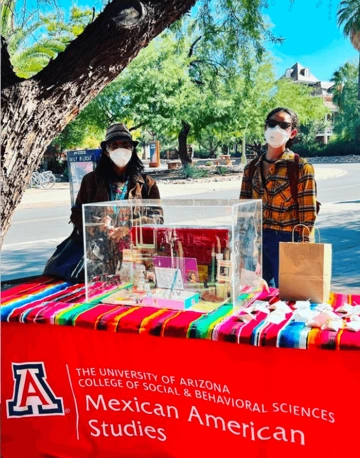Mexican American Studies
Bachelor of Arts
Quick Facts

Top 1%
of all Higher-Ed
Institutions
- Center for World University Rankings, 2024
TOP 25
Public Flagship
University
- U.S. News & World Report, 2024
When you enroll in the Bachelor of Arts in Mexican American Studies (MAS) major, you gain a deep insight into how government and public policy, minority health disparities, immigration, language, and more affect the Mexican-American population. Current U.S. demographic trends show that Mexican Americans who live and work in the Midwest, Southwest, and Southern communities also need a workforce knowledgeable about the challenges and trajectories of Mexican Americans. Students with this degree are in critical positions to inform, direct, and contribute to the progressive future of this diverse population.
The B.A. is an interdisciplinary program designed to study, recover, and disseminate knowledge of the history, culture, and intellectual legacy of Chicanx, Mexican, Indigenous, and Latinx peoples in the United States.
Mexican American Studies as a discipline uses a social justice approach to examine evidence-based social science and cultural studies to understand barriers (past and present) to the integration of Mexican Americans into U.S. society, as well as how challenges have been overcome to emerge as the largest ethnic/linguistic group in the U.S.
The MAS program is firmly committed to training future generations of scholars whose research is rooted in social justice through decolonial epistemologies, pedagogies, and scholarship at the intersections of race, class, gender and sexuality, colonialism, patriarchy, and their contemporary manifestations. The department works collaboratively with community organizations to address issues and produce knowledge benefiting historically marginalized communities in the U.S. and transnationally.
100% online, with the capstone having a possible internship or community engagement (local to the student).
*Residents of some U.S. Territories may not be eligible. Please see our Eligibility & State Authorization page for more information.
The curriculum for this program includes:
This course introduces students to Mexican-American Studies by examining Mexican-American cultural practices, community building, and identity formation in broader geopolitical and historical reference points.
This course critically examines major issues affecting today's Latinx populations using a comparative and interdisciplinary focus. Major topics include immigration, class, race, gender, sexuality, culture & identity, and the role of discrimination, laws, public policies, and policing in structuring inequality.
A culminating experience for majors involving a substantive project that demonstrates a synthesis of learning accumulated in the major, including broadly comprehensive knowledge of the discipline and its methodologies. Senior standing required.
This course focuses on issues of social difference, identity, and social status as these are reflected in scholarship about social justice and applied to social justice issues in the local, national, and international stages. The course has two distinct foci: 1) Learning about the historical and structural foundations that have led to social injustice in the United States over time, and 2) Learning how communities and movements have organized against these injustices to help move society forward.
This course analyzes Latinx communities' experiences through popular culture and media studies. You’ll draw from interdisciplinary sources to explore current theoretical ideas and debates about popular culture, identity, and representation. It is a central course for students interested in the social sciences, as well as for students interested in cultural and media studies.
This course examines the quasi-permanent presence of undocumented immigrants in the United States in an age of global movements, how this confounds established spatial orders that have conventionally defined nationhood, and the ensuing struggles for belonging and place within ‘a nation of immigrants.'
This course focuses on historical background, cultural institutions, and identity.
This a co-convened course that will include advanced 4th-year undergraduate students who along with graduate students (enrolled in MAS 570) will examine migration as a worldwide phenomenon in part due to the greater participation of women. In the Americas, in particular, there has been a steady increase in migration to the U.S. from Mexico and Latin America since the 1960s, much of which can be traced to the negative impact of structural adjustment programs (SAPs) resulting in the impoverishment of agricultural sectors and lack of employment opportunities, a combination known to produce the feminization of migration. In this class, we will explore this phenomenon and the various challenges borne by women and youths. We will consider relevant theories, such as neoliberal economics and structural violence, as well as a wide range of perspectives, combining demography, history, ethnography and public policy analysis to better understand issues of borders, transnational identities, human rights, labor rights, and responsibilities of host and sending states.











